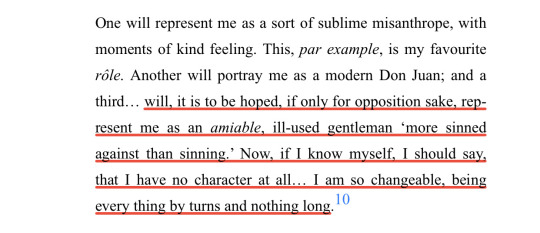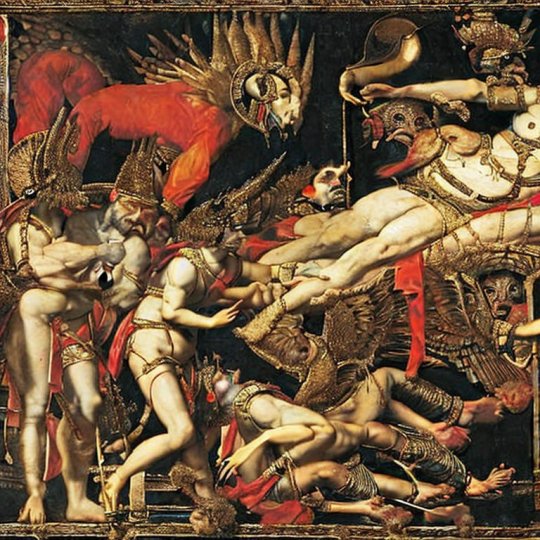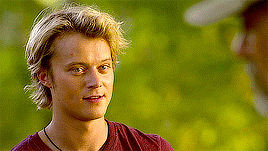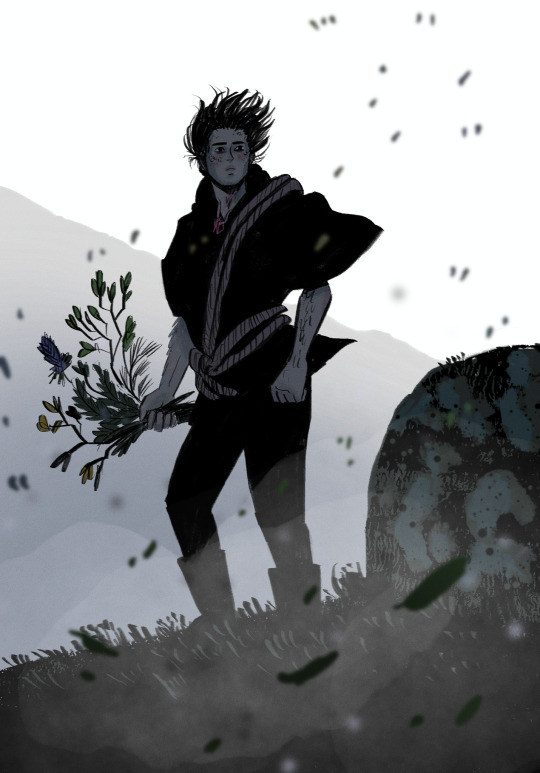#byronic
Text
Some thoughts on the topic of Byronism, Byronic Heroes, Byron himself, and Mr. Darcy, Mr. Rochester, and their respective authors...
This was inspired after I was tagged in a post (thank you @bethanydelleman !) asking whether Mr. Darcy should be considered a Byronic Hero or not. I start with my response before delving off, but I refer back at the end and it all ties in.
On Mr. Darcy: to Byronic, or not to Byronic? That is the question...
Whether or not Mr. Darcy should be considered a Byronic Hero is a complex question, as is the concept of the Byronic Hero itself.
I think there two versions of Darcy, and general pop culture tends to conflate them. There is Misunderstood Darcy (pre-"redemption" arc; aka what many think of him pre-Elizabeth's discovery of his true personality) and then there is True Darcy (post-"redemption" arc; "oh he's not rude, just socially awkward and proud"). Misunderstood Darcy has aspects of the Byronic, whereas True Darcy isn't Byronic at all.
Is Darcy Byronic? I recognize that he has Byronic elements that would make the general populace view him as Byronically aligned, so it doesn't bother me too much if people call him such, but without fully going into the debateable qualifications of the Byronic Hero, I don't think he is truly Byronic.
My interpretation of "Byronic" as a concept:
"Byronic" is not an easily defined term. A lot of academics have their own preferred methods of classifying the Byronic and there is no one fixed definition or interpretation. "Byronic" originally referred, of course, to the themes and tropes presented in the characters of Byron, who was one of the best-selling and most influential writers of the 1800s.
However, even applying the term "Byronic" solely to Byron's own corpus is an act of over-generalization. Many of Byron's purported "Byronic Heroes" are drastically different from each other or have little in common, as Byronist Peter Cochran noted in his review of Atara Stein's "The Byronic Hero in Film, Fiction and Television" (https://petercochran.files.wordpress.com/2012/07/stein-green-lapinski-ii.pdf).
I believe there are two main types of Byronic Hero: the Broad Byronic and the Byronist's Byronic.
The Broad Byronic is the modern pop cultural conception of Byronism which has been applied to practically every rebellious anti-hero. You can find thousands of articles analyzing why thousands of characters are or aren't Byronic, from Jack Sparrow to Batman to Luke Skywalker and ad infinitum. If you try hard enough, anything can be Byronic.
The Byronist's Byronic is like the Orthodox Byronic, the more traditional sense of the term. Academics who take the stritcer Byronist's Byronic approach mainly focus on Byron's direct literary descendants, like the Brontës and Pushkin, who were thoroughly obsessed with Byron and whose works/characters are directly and obviously inspired by Byron's own works. Heathcliff and Eugene Onegin are the most commonly cited examples and are Byronic by all standards.
Over time, "Byronic" has taken on a life of its own, leading to what I dubbed as "the Broad Byronic." I personally believe there is sort of a Byronic spectrum wherein I would place Heathcliff on one end and maybe Mr. Rochester on the other, considering his salvation plotline, which I feel is huge to his character and which Heathcliff lacks (as he openly declares at the end, he has no regrets for his actions).
Peter Cochran's interpretation of the Byronic Hero
Peter Cochran was a writer, professor, & one of the best Byronists (scholars of Byron) & I often defer to his opinion. His website is a haven for Byronism. His interpretation of the Byronic Hero is very much representative of the orthodox Byronist's Byronic.
In his essay "Byron's 'Turkish Tales': An Introduction," Cochan provides a brief analysis of the Byronic Hero, which I have sectioned out the most relevant parts of:
"Much has been written about him; what few writers say is that he has so many facets that it's misleading to treat him as a single archetype. [..] The Byronic hero is a human dead-end. He is never successful as a warrior or as a politician [..] he is never successful as a lover. [..] The Byronic Hero is never a husband, never a father, and never a teacher [..] He bequeaths nothing to posterity, and his life ends with him. He is to be contrasted with the Shakespearean tragic hero, who has to be something potentially life-affirming, such as a father (Lear) or a witty conversationalist (Hamlet) or a great soldier (Macbeth, Coriolanus, Antony) or a lover (Romeo, Antony). If they were not such excellent people, their stories would not be tragic. The Byronic Hero is not tragic: he's just a failure, and leads on to the Superfluous Man of Russian literature - as Pushkin demonstrated, when he created the Byronically-fixated Eugene Onegin. [..] The Byronic Hero must never be witty, or be brought in contact with a critical intelligence [..] if he were, his tale would lose its imagined grandeur [..] In his gloom, failure, and rejection of humour The Byronic Hero aligns not with the heroes of Shakespearean tragedy but with the villains of Shakespearean comedy: Shylock, Malvolio, and Jacques. [..] I would suggest that The Byronic Hero is either a closet gay, or a poorly-adjusted bisexual - a problem that Byron would have known all about."
On Mr. Rochester and Mr. Darcy
In his introduction to Charlotte Bronte's Jane Eyre: Modern Critical Interpretations, legendary literary critic Harold Bloom explained that Mr. Rochester is Charlotte Brontë taking the Byronic Hero, killing him, and then rebirthing him. I fully agree with Bloom's interpretation:
"[Rochester's] transformation heralds the death of the Byronic hero [..] Rochester is, in this sense, a pivotal figure; marking the transition from the Romantic to the modern hero [..]"
I would argue that what Austen does to Mr. Darcy is a lighter, pre-Byronic attempt at doing what Brontë did with her transformation of the Byronic in Mr. Rochester. Women growing to sympathize with rude men and then (directly or indirectly) inspiring them to change for the better. Women taking the Byronic and not just going "I can fix him," but instead "I'll tell him off, and then maybe he'll fix himself." Like Darcy, Rochester has two versions, pre-redemption and post-redemption. This is not Byronic, but their pre-redemption selves are, with Mr. Rochester being much, much more so than Darcy, and being considered an archetypal Byronic Hero (rightfully so in my opinion, his come-to-God ending aside).
Also, what Darcy and Rochester are redeemed for differs greatly; I'm not equating their moral or personal failures, and I know that Rochester clearly has more of them (if any anti-Rochester, pro-Darcy fan is out there, pls don't kill me for comparing them).
On Austen and Byron:
Austen started writing P&P when Byron was 8-years-old, so she definitely wasn't influenced by the actual Byron in creating Mr. Darcy. However, Austen did read Byron's work later on, or at least his poem The Corsair, which was his best-selling work at the time and which is one of his most cliché "Byronic" works. She did write some works, like Emma and Persuasion, after reading The Corsair, but I haven't read these yet and I'm not the biggest Austen scholar, so I don't know if she was ever actually influenced by Byron or not. I'm positive that people have analyzed this before. Lots has been written on Austen/Byron. They also shared a publisher, though they never met.
On Byronic (the writer) VS Byronic (the writer's characters):
To further confuse us, "Byronic" by its literal definition can refer to the Byronic Hero OR Byronic as in Byron the Man. Many conflate these things, but they are separate. This adds to the case of the Broad Byronic. Many of Byron's contemporaries created characters that were direct and obvious tributes or parodies of him, including Mary Shelley's The Last Man, Percy Shelley's Julian and Maddalo, and Thomas Love Peacock's Nightmare Abbey. They all knew Byron personally. Mary Shelley openly put Byron into several of her novels, as explained in "Byron and Mary Shelley" by Ernest Lovell Jr. and "Unnationalized Englishmen in Mary Shelley's Fiction" by William Brewer. Other notable examples of this are Caroline Lamb's Glenarvon (Lamb was Byron's ex) and Dr. John Polidori's The Vampyre (Polidori was Byron's doctor) in which both titular characters were/are clearly known by readers to be caricatures of Byron. The Vampyre was the first vampire novel, and was not only a caricature of Byron but also based on Byron's short story Augustus Darvell. So all modern "Byronic" vampires, including Dracula, are really Byronic as in Byron the Man, although they sometimes may overlap with the Byronic Hero. As I said, easily confusing!
As many academics (and Lord Byron himself) have noted, many of Byron's fans wrongly conflated his characters with himself. Although many of Byron's works were indeed semi-autobiographical, he himself said that they were not intended as actual depictions of himself, and that he was annoyed when people thought so. Many fans who met him would write they were shocked to find he was nothing like the Byronic Heroes of his works. He was humorous, he smiled often, he was somewhat of a dandy and much of a rake (self-confessedly), he was an aristocrat, he was considered by many to be effeminate, etc. -- all elements that are not typically expected of the Byronic Hero.
In reference to his drama The Deformed Transformed (which contains the characters Satan and Caesar) Mary Shelley wrote to him in a letter:
"The Critics, as they used to make you a Childe Harold, Giaour, & Lara all in one, will now make a compound of Satan & Caesar to form your prototype, & your 600 firebrands in Murray's hands will be in costume." [John Murray was Byron's publisher]
Here, Mary mentions how many of Byron's readers expected him to be just like his characters Harold, Giaour, & Lara, who fans assumed were his self-insert characters, as they each had strong similarities. However, these characters were more similar to "alter-egos" than actual "self-portraits." My personal interpretation is that Byron was writing these very similar dark anti-heroes and villains in order to channel the darker aspects of his subconscious, or what Jung would call his Shadow Self, to try to purge or subdue it. Though he lived before the field of psychology officially existed, Byron was very interested in all things psychological, and he used his writing as a method of self-therapy (see: Touched with Fire written by psychologist Kay Jamison, which contains one of the most thorough & reliable psychoanalyses of him).
As Bloom explains in the essay I mentioned, and as countless other academics have explained, Charlotte Brontë and many other women in the early 1800s were obsessed with Byron and his works. Byron's English-speaking fan base has always been primarily female, especially in the beginning of his career. Byron's fans wrote him letters revealing their differing interpretations of him and his Byronic Heroes (but again, most didn't really differentiate between the two).
Likewise, I think the Brontë sisters may have conflated Byron with his Byronic Heroes. Mr. Rochester is such a strong example of Byron the Man and has so many similarities to him that when reading Jane Eyre I felt like I was reading Lord Byron fanfiction. It's clear that Charlotte Brontë was familiar with his biography. For example (one of countless), in chapter 17 Rochester sings what he calls "a Corsair song" -- as I mentioned earlier, The Corsair was one of Byron's greatest hits, and Jane Eyre is set around the time The Corsair was published, and Byron also wrote songs and was also known for his good voice.
Although the Brontë sisters were each influenced by him, they took their own individual spins on the Byronic, and their works reveal the dynamicism of these themes. In my opinion, Emily employs the Byronist's Byronic most raw and faithfully (and maybe even takes it further), Charlotte punishes, redeems, and transforms the Byronic with much influence from Byron the Man, and Anne presents the Byronic most critically and realistically, asking "what if the Byronic Hero were real, and really got married -- what would that look like?" and having perhaps the most (Broadly) Byronic heroine ever, who is also later redeemed by the end, and has her veil of Byronic mystery removed much like Darcy did.
#lord byron#byronism#byronic hero#mr rochester#charlotte brontë#criticism#literary criticism#analysis#my analysis#my essays#harold bloom#mr darcy#byron#byronic#literature#english literature#romanticism#mary shelley#peter cochran#jane austen#pride and prejudice#jane eyre#the brontes#my writing
104 notes
·
View notes
Text
"What are you doing?"
"I'm brooding."
"Brooding?"
"You know. Byronically."
"You're not Byronic."
"I am."
"You can't be Byronic in stripey pajamas."
"Fucking watch me."
952 notes
·
View notes
Note
If Victor Frankenstein was indeed based on Byron does that mean he's the One True Byronic Hero?
Lol, I said in the last post that I WASN'T an expert on the Byronic. But here is another ask about it. Oh well....
All I know is that Victor Frankenstein is the One True Drama Queen and a horrible "father".
24 notes
·
View notes
Text
Zoey and Zach || Continued from here@byronlc

There was something oddly comforting about sitting beside him and reading. Sure, their books were VERY different. But she liked that. She liked that he wasn't like her. It's what made her fall for him. They were so different, yet there was an attraction that went deeper than Physical.
She was enjoying her book, concentrating on it, but every so often, she sensed he was looking at her. She would lift her head, only to see him turn his head quickly and look back at his book.
Playfully rolling her eyes, she smiled and turned her attention back to her book. Part of her wanted to toss her book aside, and then grab his and just kiss him. But she wasn't going to be the first to make the move.
Eventually, Zoey stretched a little and put her book to one side, standing up to get a drink. As she walked past him, she was about to ask if he wanted anything, when she felt his hand smack her rear.
"Hey." She squeaked and turned to face him.
"Don't act so innocent mister." She laughed. "I was going to ask you if you wanted something while I was up, but I think you should probably come begging for my forgiveness." She smirked "Maybe a few kisses." She chuckled as she headed towards the Kitchen.

12 notes
·
View notes
Text
I wish I had literature friends. I'm puzzling over the idea of a Byronic Antihero, with my example being Mr. De Winters from Rebecca. I'm not well read enough to come up with another example, or to well define what precisely a Byronic Antihero would be.
#Byronic#mr. de winters#mr. rochester#rebecca#jane eyre#antihero#anti hero#byronic antihero#moody wet cat of a man#murdurrr#british literature#literature#is this a thing?
15 notes
·
View notes
Text
Gentlemen, girls don't care if you're tall. Girls care if you're Kafkaesque.
16 notes
·
View notes
Text

Lord Byron about himself, from Select Poems
#mine#anger’s my meat — i sup upon myself#lord byron#george gordon byron#baron byron#selected poems#don juan#romanticism#to keep#romantic age#percy bysshe shelley#percy shelley#mary shelley#romantic period#byronic#literature#biography#quotes#q
56 notes
·
View notes
Photo




The Stable Diffusion version of “The Death of Sardanapalus”
32 notes
·
View notes
Text
@byronlc

Rumor was Ward Cameron had an older son in town. What JJ didn't expect was that he looked just life Rafe. JJ could tell he wasn't Rafe by his demeanor. He'd be in his face the minute he saw JJ.
Luckily the pogue got his job back. It was his last shot at the Country Club. He needed it. One more fight or outburst with a kook he was out for good. "Can I get you anything?" JJ asked, flipping over the notepad to write down his order.
5 notes
·
View notes
Text
“A possible subtitle for Onegin would be, ‘Reading Byron will ruin your life.’”
— Byronist scholar Peter Cochran on Alexander Pushkin’s Eugene Onegin; from The Little House at Kolomna by Pushkin Review.
#he’s right#lord byron#peter cochran#alexander pushkin#eugene onegin#literature#english literature#russian literature#romanticism#aesthetic#poetry#russian lit memes#byronic#byronism#dark academia#history#writing#books#reading#gothic#romantic#byron
100 notes
·
View notes
Note
❛ you're an idiot, but... i trust you. ❜ from Dylan

"I dont know, dude. You seem to be a bigger idiot, if you trust an idiot." Nick's tone was sarcastic.
@byronlc
3 notes
·
View notes
Text
@byronlc asked: 21) for receiver to leave several bite marks on sender’s belly abs.
(from Trevor for Anna)

Muse: Anna Seymore
Anna smirked as she licked the blood from his abs, humming a little as her looked through her long lashes at him.
"You taste delicious my darling." She hummed, swiping her tongue all the way up till she kissed his jaw.

6 notes
·
View notes
Note
📸for Zoey from Zach
Send a 📸 to see 3-5 pictures that my muse has/has taken of your muse(s)

2 notes
·
View notes
Text
Byronic hero?
Just say chaotic manwhore slutgremlin.
3 notes
·
View notes
Text

Black through the mountains
#drawing#illustration#digital art#comic#ill fame#webcomic#comics#art#procreate#mountains#moody#Byronic#the caption is a Patrick wolf lyric#the song bitten
4 notes
·
View notes
Photo

2 notes
·
View notes